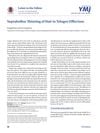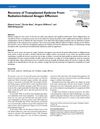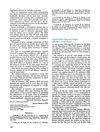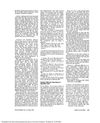1 citations,
April 2021 in “Nepal journal of dermatology, venereology & leprology” Iron profile tests are recommended for women with hair loss, as haemoglobin levels alone are not reliable.
 1 citations,
March 2021 in “Skin”
1 citations,
March 2021 in “Skin” Public interest in hair loss increased during the COVID-19 pandemic.
 1 citations,
February 2021 in “Clinical, Cosmetic and Investigational Dermatology”
1 citations,
February 2021 in “Clinical, Cosmetic and Investigational Dermatology” Low iron levels in the blood could be a sign of Telogen Effluvium, a type of hair loss, but it's not always accurate in distinguishing it from other hair loss types.
[object Object]  1 citations,
January 2021 in “Dermatologic Therapy”
1 citations,
January 2021 in “Dermatologic Therapy” Trichobiolight effectively treats hair loss with 82.5% success.
 1 citations,
December 2020 in “Medicinskij alfavit”
1 citations,
December 2020 in “Medicinskij alfavit” Telogen effluvium is a condition that causes temporary hair loss.
 1 citations,
December 2020 in “Harran Üniversitesi týp fakültesi dergisi”
1 citations,
December 2020 in “Harran Üniversitesi týp fakültesi dergisi” Many people with hair loss had low iron and ferritin levels.
 1 citations,
January 2020 in “Indian Dermatology Online Journal”
1 citations,
January 2020 in “Indian Dermatology Online Journal” Pigtail hair is a sign of new hair growth and should be recognized in hair loss conditions like acute telogen effluvium.
 1 citations,
September 2019 in “Springer eBooks”
1 citations,
September 2019 in “Springer eBooks” Telogen effluvium is a condition that causes temporary hair loss due to stress or shock to the body.
 1 citations,
July 2019 in “Farmatsevtychnyĭ zhurnal”
1 citations,
July 2019 in “Farmatsevtychnyĭ zhurnal” The optimal gel-mask for hair loss contains 15% nettle juice, 0.5% carbopol ultrez 10 and sodium alginate, 0.1% potassium sorbate, and 0.4% PEG-40 hydrogenated castor oil.
 1 citations,
January 2019 in “Turk Dermatoloji Dergisi”
1 citations,
January 2019 in “Turk Dermatoloji Dergisi” Oxidative stress is likely important in causing telogen effluvium, and antioxidants might help treat it.
 1 citations,
January 2018 in “Turkiye Klinikleri Journal of Dermatology”
1 citations,
January 2018 in “Turkiye Klinikleri Journal of Dermatology” Vitamin D levels are not correlated with chronic hair loss in Telogen Effluvium patients.
 1 citations,
January 2018 in “Journal of cosmetology & trichology”
1 citations,
January 2018 in “Journal of cosmetology & trichology” Hair loss lotion with specific ingredients effectively improves hair growth and thickness safely.
1 citations,
January 2018 in “Annals of medical research” No link found between blood groups, Rhesus factor, and ferritin levels in women with hair loss.
 1 citations,
January 2018 in “Acta dermatovenerologica Alpina, Pannonica et Adriatica (Tiskana izd.)”
1 citations,
January 2018 in “Acta dermatovenerologica Alpina, Pannonica et Adriatica (Tiskana izd.)” The herbal extract was found to effectively reduce and prevent hair loss without any side effects.
 1 citations,
October 2017 in “Our Dermatology Online”
1 citations,
October 2017 in “Our Dermatology Online” The conclusion is that a brown halo around hair follicles, seen in rapid hair loss, might be linked to inflammation or chemical exposure.
 1 citations,
May 2017 in “InTech eBooks”
1 citations,
May 2017 in “InTech eBooks” Telogen Effluvium is a common hair loss condition that can be short-term or long-lasting and is often caused by stress, illness, or nutritional issues.
 1 citations,
January 2017 in “Yonsei Medical Journal”
1 citations,
January 2017 in “Yonsei Medical Journal” Hair is thinner near the scalp in acute hair shedding conditions.
 1 citations,
December 2016 in “Vìsnik farmacìï”
1 citations,
December 2016 in “Vìsnik farmacìï” The best gel to treat a type of hair loss has 1% sodium alginate, 1% carbopol, 5% glycerin, 0.2% potassium sorbate, and water.
 1 citations,
March 2015 in “Journal of Cutaneous Medicine and Surgery”
1 citations,
March 2015 in “Journal of Cutaneous Medicine and Surgery” Eyebrow hair transplants can regrow after high-dose radiation therapy.
 1 citations,
March 2014 in “Senses and Sciences”
1 citations,
March 2014 in “Senses and Sciences” A supplement with Serenoa repens improved hair loss in a patient.
 1 citations,
January 2014 in “PubMed”
1 citations,
January 2014 in “PubMed” Hair loss in a child was an early sign of Crohn's disease.
 1 citations,
October 2013 in “A & A case reports”
1 citations,
October 2013 in “A & A case reports” Hair loss from telogen effluvium may not happen again after another surgery.
[object Object]  1 citations,
January 2013 in “Journal of Cosmetics, Dermatological Sciences and Applications”
1 citations,
January 2013 in “Journal of Cosmetics, Dermatological Sciences and Applications” The document concludes that a new treatment for a type of hair loss called telogen effluvium was tested and shows promise.
 1 citations,
January 2009 in “Journal of Clinical Dermatology”
1 citations,
January 2009 in “Journal of Clinical Dermatology” Hair loss after childbirth is more common in women who have had multiple births, cesarean deliveries, significant weight gain, and full-term pregnancies.
 1 citations,
June 2007 in “Journal of Oral and Maxillofacial Surgery”
1 citations,
June 2007 in “Journal of Oral and Maxillofacial Surgery” A woman experienced temporary hair loss after jaw surgery due to the stress of the operation.
 1 citations,
August 1978 in “Dicp-The annals of pharmacotherapy”
1 citations,
August 1978 in “Dicp-The annals of pharmacotherapy” A liquid protein diet caused hair loss in a young woman.
 1 citations,
May 1976 in “Archives of Dermatology”
1 citations,
May 1976 in “Archives of Dermatology” Extreme weight loss from crash dieting can cause significant hair loss.
 January 2025 in “International Journal of Scientific Research”
January 2025 in “International Journal of Scientific Research” High serum fluoride levels may be linked to hair loss.
 December 2024 in “Ukrainian Journal of Dermatology Venerology Cosmetology”
December 2024 in “Ukrainian Journal of Dermatology Venerology Cosmetology” "Alpenta" effectively reduces hair loss and improves hair growth in women with telogen effluvium.
 December 2024 in “Journal of General-Procedural Dermatology & Venereology Indonesia”
December 2024 in “Journal of General-Procedural Dermatology & Venereology Indonesia” Wearing a hijab is linked to a higher risk of hair loss.



























